
Macheso, Majuice promise fans unforgettable night of music and dance in Watsomba
November 7, 2019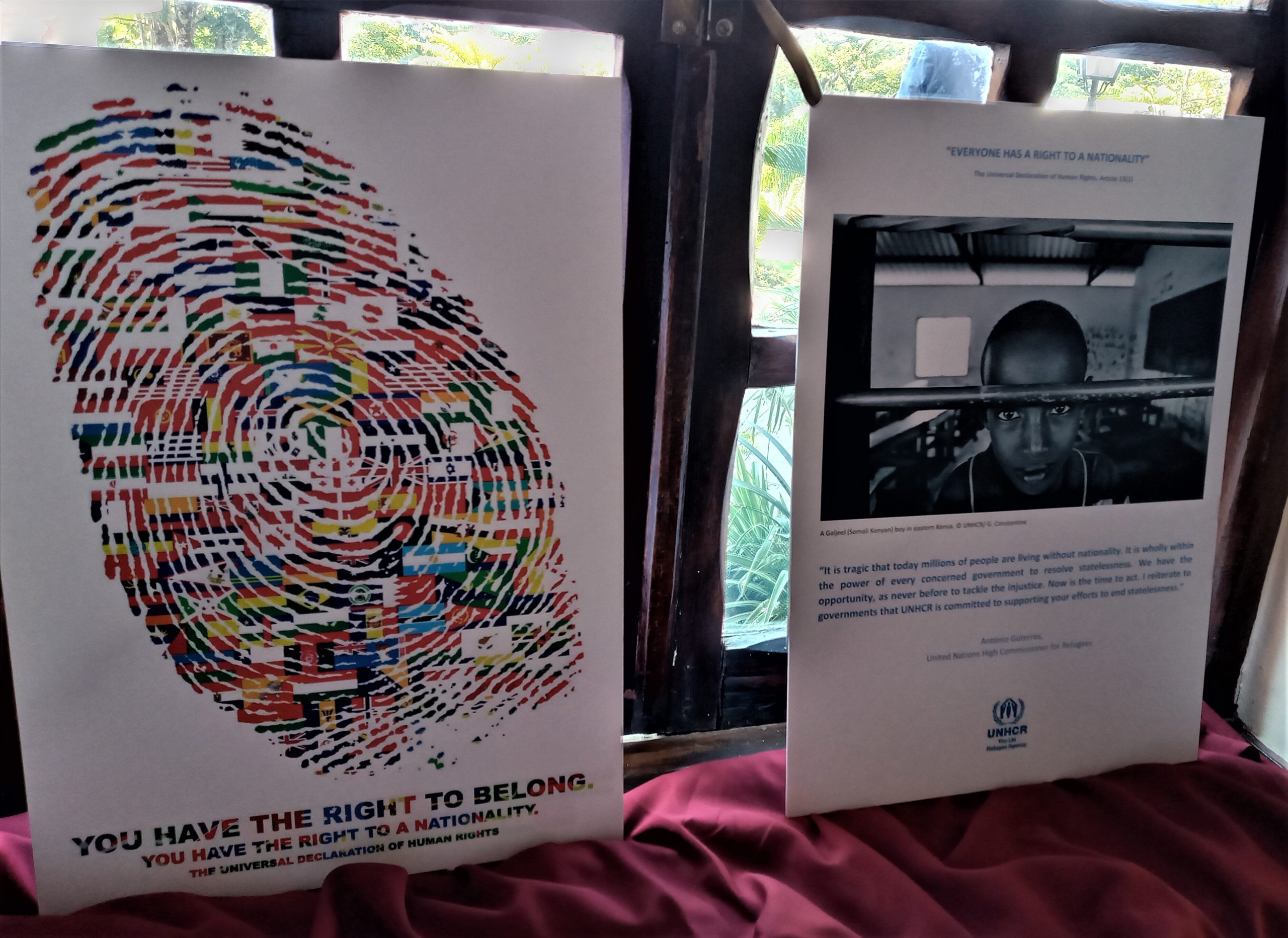
Zimbabwe unmasks roadmap to deal with statelessness
November 21, 2019Parliamentarians urged to mainstream Statelessness on legislation reforms

UNHCR country representative Shana Kaninda.
“Statelessness is a man-made problem and only requires good will and political will to eradicate it”
Ngoni Dapira
GAPS in the Citizenship Act need to be amended and aligned with the Constitution to help deal with statelessness which is increasingly becoming a growing concern worldwide, the deputy president of Senate, retired Lieutenant General Mike Nyambuya has said.
Speaking on Friday during the official opening of the three-day workshop on nationality and statelessness in Zimbabwe, which was organized by the United Nations High Commissioner for Refugees (UNHCR), Senator Nyambuya urged parliamentarians to familiarize themselves with the ‘2014 Handbook on Nationality and Statelessness for Parliament’ in order to contribute meaningfully to the enactment of legislation that resolve the statelessness challenge.
According to international law a stateless person is a person who is not considered as a national by any State under the operation of its law, and thus becomes an invisible alien or social misfit without an identity.
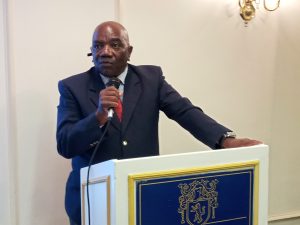
Senator Mike Nyambuya
“Whilst the Government of Zimbabwe has put in place pieces of legislation to deal with statelessness, gaps still exist within the Citizenship Act [Chapter 4:01] which operationalizes the provisions of the Constitution and gives effect to the right to citizenship, but a process is currently under way to review this Act. In addition, the Births and Deaths Registration Act [Chapter 5:02], the Immigration Act [Chapter 4:02] and the National Registration Act [Chapter 5:17] are all relevant to the discussion on nationality,” said Senator Nyambuya.
The high level workshop which ends today (Sunday) was primarily aimed at opening dialogue on the significance of the 1961 Convention on the Reduction of Statelessness and the recommended legal safeguards in addressing statelessness. The workshop comes on the heels of Zimbabwe having recently signed the UNHCR commitment declaration form on statelessness which was signed last month.
Senator Nyambuya said the consequences of statelessness are poverty, failure to get identity documents, failure to get education, food insecurity, lack of housing and formal employment, discrimination, exploitation and other human rights issues. Adding that statelessness is caused by excessive requirements for documentation, migratory workers, broken family ties, unaccompanied minors, and situations of discrimination of populations, such as women.
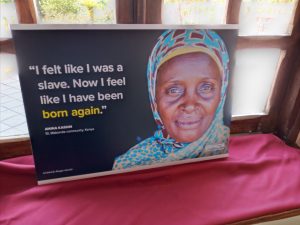
One of the ‘#IBelong campaign’ posters illustrating statelessness.
“As MPs (Members of Parliament) we need to enact laws that address the different challenges which may cause statelessness. For example, some children are born of parents where the father and mother are from different countries, and therefore, there is confusion on which country they belong to. In addition, children born of refugees encounter problems in that sometimes they are granted temporary birth registration, which does not state their nationality. Furthermore, children left without parents are also vulnerable to becoming stateless.” he said.
The UN Refugee Agency, UNHCR, said citizenship is one of the important rights provided for in the Constitution of Zimbabwe, which talks about belonging, identity and access to rights, benefits and privileges.
Senator Nyambuya said the gaps within the country’s nationality laws must be dealt with quickly. He added that as a country, Zimbabwe is not spared from this challenge of statelessness, which is why there should be an urgent need to avail country data on statelessness because many Zimbabweans believe there are no stateless people in the country.
“Farm workers of foreign origin represent one of the most vulnerable groups in Zimbabwe. An estimated 30 percent of two million farm workers and their families are believed to be of foreign descent. Many were born in Zimbabwe but lack birth certificates of national identity cards. They have also lost ties with their country of origin and have no place to return to when evicted from the farms. There is also need to look at the issue of statelessness with a gender lens as it impacts more on women and children. Women experience statelessness physically due to human trafficking, xenophobia, civil unrests and economic challenges, which have caused migration to other countries where people then seek refugee status,” he said.
In 2014 UNHCR launched the ‘#IBelong campaign’ and the Global Action Plan to end statelessness in 10 years by 2024. UNHCR country representative Shana Kaninda said they wish to strengthen their relationship with the Zimbabwean Government through parliamentarians and ensure closer collaboration in areas of mutual interest on statelessness. He said ending statelessness by 2024 was an ambitious objective, but with the strong advocacy and leadership of the parliament as the custodians of human rights, it is achievable.
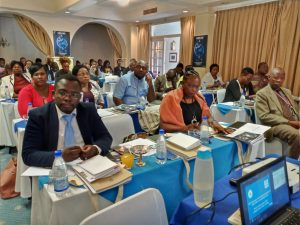
Part of the participants following proceedings.
Kaninda said for decades now, statelessness has been a forgotten human rights crisis and was first recognized as a global problem in the early 20th century. “The escalation of violations of the rights of stateless people and the consequences and impact of statelessness on the individual, family and at the national and international levels, has necessitated an intensification of the efforts towards the protection of stateless people, a reduction and eventual eradication of statelessness and has consequently made its way onto the political agenda of Governments,” he said.
He cited that within the first half of the campaign, more countries have acceded to the 1954 Convention Relating to the Status of Stateless Persons and the 1961 Convention on the Reduction of Statelessness, than in the decades following adoption of these international instruments on statelessness, which is commendable progress.
Kaninda said statelessness is a man-made problem and only requires good will and political will to eradicate it as he urged Parliamentarians to be at the forefront of the campaign. Adding that Parliamentarians can demonstrate their good will and determination in eradicating statelessness by adopting nationality legislation that is consistent with international law and encompasses the necessary safeguards in preventing statelessness at birth and later in life.
“Parliaments also play an important role in providing oversight to ensure the policy and administrative frameworks do not inadvertently or deliberately render individuals stateless. Through strong advocacy and championship, parliamentarians can encourage governments to eradicate statelessness and raise awareness on the causes and consequences of statelessness amongst their constituents and supporters as well with all relevant stakeholders. Therefore Parliaments as the custodians of human rights, accordingly hold a fundamental role to play in ending statelessness through legislative reform and in the accession and domestication of international instruments,” emphasized the UNHCR country representative.”
Adding, “This second half of the #IBelong campaign provides the opportunity for States to receive the required support in implementing actions identified. I, as the Country Representative wish to reiterate UNHCR’s commitment in supporting the Government of Zimbabwe in achieving the pledges registered in ending statelessness by 2024 during the 70th session of the Executive Committee Meeting held last month in October; including accession to the 1961 Convection of the Reduction of Statelessness and alignment of national legislation with the new Constitution of Zimbabwe and international standards.”
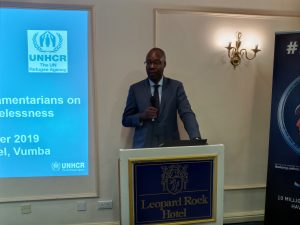
Mr Zulu
UNHCR deputy director regional bureau for Southern Africa, Leonard Zulu said this meeting was an important milestone in the joint endeavour to put an end to the risk of statelessness in Zimbabwe. Zulu however revealed that Zimbabwe acceded to the 1954 Statelessness Convention, but not the 1961 Convention on the Reduction of Statelessness, but nonetheless complemented Zimbabwe for demonstrating an extraordinary commitment to the fight against statelessness.
Zulu said while UNHCR is globally known as the refugee agency, its statelessness mandate was less known, which should change through the ‘#IBelong’ campaign. He said statelessness thus poses a challenge to social and economic development adding that dealing with this would create inclusive societies, fostering the prosperity of individuals as well as countries.“Refugees and stateless persons are two different categories of people but both are in need of international protection… While most of us take for granted the fact of having a nationality, for those who do not or cannot prove it, it is often a sentence for a life of discrimination, frustration and despair. This problem affects at least 10 million people around the world. Even worse, a child is born stateless every 10 minutes somewhere in the world,” said Zulu.
He said stateless people face immense challenges on a daily basis citing that in the absence of a recognized nationality, the most common daily activities become an almost insurmountable obstacles. “To work and hope for fair and equitable remuneration, to enjoy a certain freedom of movement without being harassed, to carry out simple banking transactions such as cashing a cheque, claiming legal assistance or social benefits. A person who cannot justify his or her nationality is often confronted with serious risks of chain expulsion and random, sometimes indefinite, detention periods,” he said.
The workshop which ended today drew four Parliamentary portfolio committees, namely Foreign Affairs and International Trade; Defense, Home Affairs and Security Services; Justice, Legal and Parliamentary Affairs and the Women Affairs, Gender and SMEs Development as well as stakeholders from the Ministry of Foreign Affairs and International Trade, Department of the Registrar General, Zimbabwe Human Rights Commission, Zimbabwe Lawyers for Human Rights and Legal Resource Foundation.


